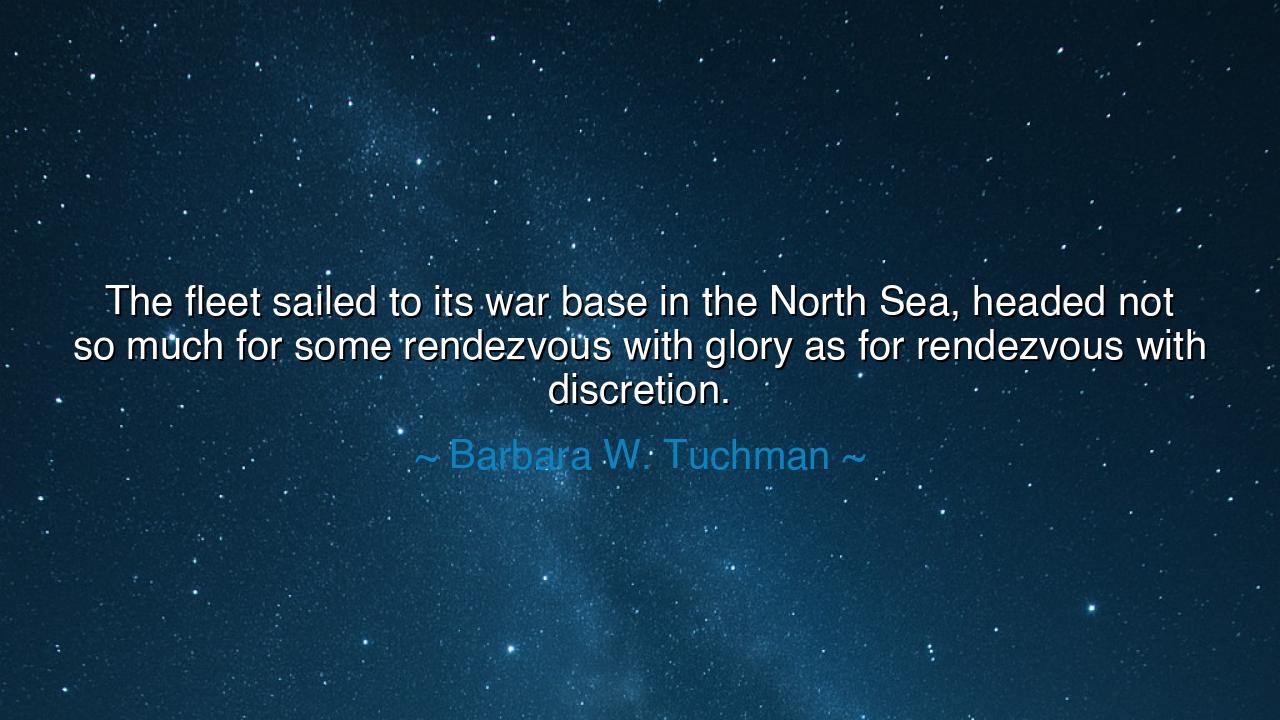
The fleet sailed to its war base in the North Sea, headed not so
The fleet sailed to its war base in the North Sea, headed not so much for some rendezvous with glory as for rendezvous with discretion.






In the contemplative words of Barbara W. Tuchman, the great historian of war and folly, we find a truth both ironic and profound: “The fleet sailed to its war base in the North Sea, headed not so much for some rendezvous with glory as for rendezvous with discretion.” These words, drawn from her magisterial work The Guns of August, do not speak of valor, but of the quiet dread that often accompanies the march toward conflict. They tell of a moment in history when men, armed with the might of empires, moved not with courage’s song in their hearts, but with fear and hesitation, knowing that what awaited them was not triumph, but tragedy.
The origin of this quote lies in Tuchman’s depiction of the opening days of World War I, when the British fleet—one of the most powerful naval forces in human history—set sail from its peacetime ports to take up its war station in the North Sea. Yet this was no triumphant departure. There were no cheering crowds, no promises of swift victory. The mood was somber, heavy with the knowledge that a great and terrible storm was beginning. Tuchman, ever the artist of irony, contrasts the romantic ideals of glory with the grim necessity of discretion, capturing how modern war had stripped away the illusions of heroism that once accompanied it.
To say that the fleet sailed toward a “rendezvous with discretion” is to reveal the death of illusion. In the ancient world, war was a stage upon which men sought immortality—heroes striving for eternal renown, kings seeking divine favor. But the war of 1914 was no such theatre. It was born not of courage, but of miscalculation—a machinery of destruction powered by pride and folly. The admirals and generals, heirs to centuries of martial legend, found themselves trapped in a war that offered no glory, only ruin. Their “discretion” was not cowardice, but the grim wisdom of those who knew that this was no righteous crusade, only a descent into chaos from which none would emerge unchanged.
Consider the tragic story of Admiral John Jellicoe, the commander of that very British fleet. His task was to safeguard the empire’s naval supremacy, yet he feared, rightly, that a single mistake could cost Britain the war. When the Battle of Jutland came in 1916, Jellicoe fought brilliantly, preserving his fleet but earning criticism for not destroying the enemy outright. Churchill later said of him, “He was the only man on either side who could lose the war in an afternoon.” Jellicoe’s was indeed a rendezvous with discretion—a man caught between boldness and caution, knowing that the wrong choice could doom a nation. His restraint, mocked by some, was in truth an act of profound understanding: that sometimes, in a world of fire, the greatest courage lies in restraint.
Tuchman’s insight reaches beyond war; it speaks to the nature of power and prudence. Every age faces moments when humanity must choose between reckless glory and careful wisdom. The fleet that sailed into the North Sea is a mirror for all who wield great power—whether in nations, in industries, or in hearts. Too often, we glorify boldness and condemn caution, forgetting that history’s most enduring victories are those born of patience and foresight. For every hero who charges into the fray, there must also be one who stands firm, thinking not of glory, but of consequence.
The deeper meaning of her words, then, is not one of despair, but of maturity. The world had entered a new age—an age where technology, politics, and pride could destroy millions. In such an age, discretion became not weakness, but the highest form of wisdom. The fleets of history, the leaders of nations, and even the hearts of ordinary people must learn this truth: that the line between honor and folly is drawn not by courage alone, but by judgment.
So, my children, learn this from the wisdom of Tuchman’s pen: seek not glory that blinds, but discretion that preserves. In your own life, there will be times when the world urges you to act rashly—to fight every battle, to prove your worth through conquest. But remember: not every war is worth waging, and not every victory brings peace. There is heroism in restraint, nobility in patience, and strength in humility. The wise do not always march to the drums of glory—they listen for the quieter voice of conscience and reason. For history, as Tuchman reminds us, does not always honor the boldest—it honors the wisest, those who know when to advance, and when to hold their fire beneath the gathering storm.






AAdministratorAdministrator
Welcome, honored guests. Please leave a comment, we will respond soon